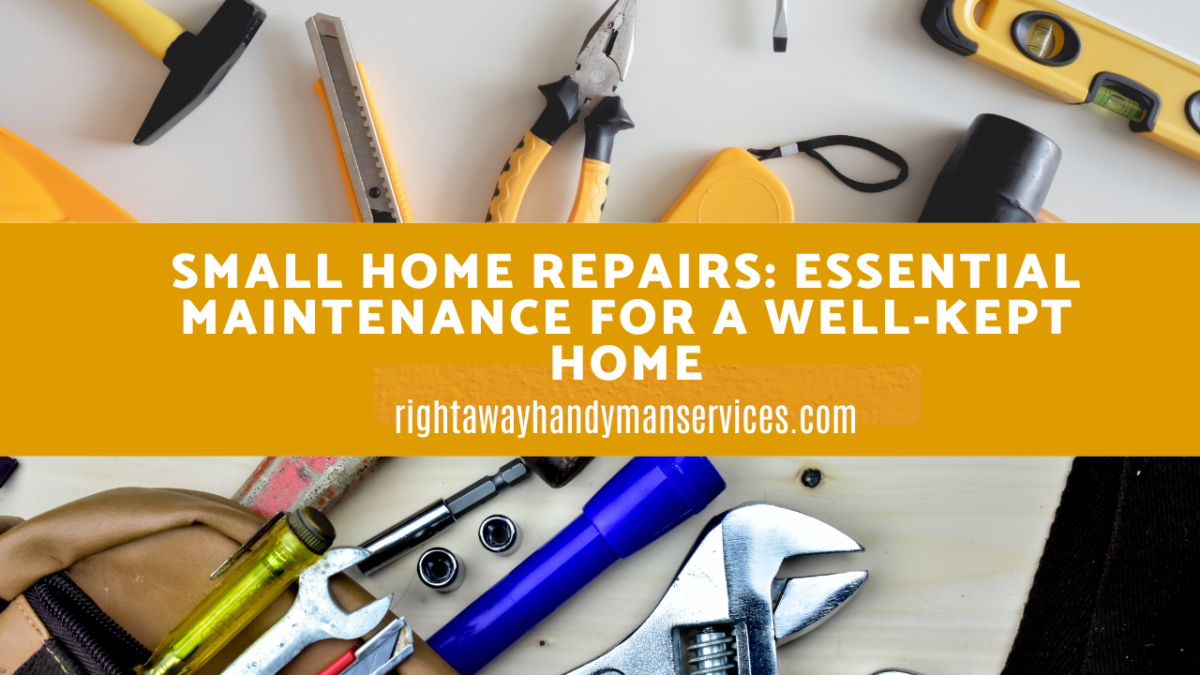Small Home Repairs: Essential Maintenance for a Well-Kept Home

Handyman TV Installation: Expertise and Precision for the Perfect Setup
August 15, 2024
Handyman Near Me for TV Wall Mount: Expertise and Precision for Secure
August 15, 2024Maintaining a home requires ongoing tasks, with small repairs being crucial for preserving function and appearance. Addressing these minor fixes promptly can prevent bigger problems and contribute to a safe, comfortable, and attractive living space.
Introduction to Small Home Repairs
Small home repairs encompass a wide range of tasks, from fixing a leaky faucet to patching up drywall holes. While these issues might appear trivial, they can accumulate over time, leading to more significant damage and higher repair costs if left unattended. Regularly addressing these minor problems is essential for keeping your home in top condition.
Homeowners often underestimate the impact of small home repairs, viewing them as low-priority tasks. However, by staying on top of these repairs, you not only maintain the value of your home but also enhance its safety and comfort. This article delves into the importance of small home repairs and provides insights into how to effectively manage these tasks.
The Importance of Timely Small Home Repairs
Timely small home repairs are critical for several reasons, each contributing to the overall well-being of your home:
- Preventing Larger Issues: Many significant home repair problems start as small issues that, if neglected, can escalate. For example, a minor roof leak, if not addressed, can lead to extensive water damage, mold growth, and structural problems. By fixing these issues early, you can avoid more extensive and costly repairs.
- Maintaining Home Value: A well-maintained home retains its value better than one with visible signs of neglect.Small home repairs, such as fixing chipped paint, broken fixtures, or replacing worn-out materials, are crucial. They enhance both the aesthetic and structural integrity of your property, which is especially important if you plan to sell your home in the future.
- Enhancing Safety and Comfort: Safety hazards can arise from seemingly minor problems, such as loose handrails, uneven flooring, or faulty electrical outlets. Addressing these issues promptly ensures that your home remains a safe and comfortable place for you and your family.
- Improving Energy Efficiency: Small repairs can also have a significant impact on your home’s energy efficiency. For example, sealing gaps around windows and doors, repairing insulation, or fixing leaks in the HVAC system can reduce energy waste, lower utility bills, and create a more comfortable living environment.
Common Types of Small Home Repairs
Small home repairs can range from simple do-it-yourself tasks to more complex fixes that require professional expertise. Some of the most common types of small home repairs include:
- Plumbing Repairs: Leaky faucets, slow drains, and running toilets are common plumbing issues that can lead to water waste and higher utility bills. Promptly repairing these problems not only conserves water but also prevents potential water damage.
- Drywall Patching: Holes, cracks, and dents in drywall are common occurrences in any home. These imperfections can detract from the appearance of a room and, if left unaddressed, may lead to more extensive wall damage. Patching up drywall is a simple repair that restores the smooth, clean look of your walls.
- Electrical fixes such as loose outlets, flickering lights, and faulty switches might seem minor, but they can pose safety hazards if not addressed. Keeping your home’s electrical system in good working order is crucial for preventing accidents and ensuring a reliable power supply.
- Carpentry repairs are essential for keeping your home functional and looking good. From fixing broken cabinet doors to repairing loose floorboards, these tasks ensure everything stays in top condition.These repairs often require precise work to ensure that the fixtures and structures remain sturdy and safe.
- Paint Touch-Ups: Over time, paint can chip, fade, or become stained, affecting the look of your home. Small touch-ups to walls, trim, or exterior surfaces can refresh the appearance of your home and protect the underlying materials from damage.
- Keeping your gutters clear of debris and properly attached to the house is crucial to prevent water damage. Regular maintenance, including minor repairs to leaks or loose sections, ensures water is effectively channeled away from your home’s foundation.
The Role of Professional Assistance in Small Home Repairs
While many small home repairs can be handled by homeowners, there are instances where professional assistance is advisable. A professional handyman brings expertise, experience, and the right tools to ensure that repairs are done correctly and efficiently. This is particularly important for repairs that involve specialized skills, such as electrical work or extensive carpentry.
Hiring a professional for small home repairs also offers peace of mind, knowing that the job is completed to a high standard. Professionals can identify underlying issues that may not be immediately apparent, addressing potential problems before they become more serious. Additionally, professional repairs are often completed more quickly and with better results than DIY attempts, saving you time and effort.
The Long-Term Benefits of Regular Small Home Repairs
Maintaining a regular schedule of small home repairs offers long-term benefits that extend beyond immediate fixes. By staying proactive, homeowners can enjoy a home that is not only aesthetically pleasing but also structurally sound and energy-efficient. Regular maintenance also reduces the likelihood of emergency repairs, which can be disruptive and costly.
Furthermore, a home that is well-maintained through regular small repairs is more enjoyable to live in. You can take pride in a home that looks good, functions well, and provides a safe environment for your family. Whether it’s fixing a squeaky door, patching up a wall, or replacing worn-out fixtures, these small efforts add up to create a home that is comfortable, efficient, and well-kept.
Strategies for Managing Small Home Repairs
Effectively managing small home repairs requires organization and a proactive approach. Here are some strategies to help you stay on top of these tasks:
- Create a Maintenance Schedule: Develop a schedule that includes regular inspections and seasonal maintenance tasks. This helps you identify and address small issues before they become bigger problems.
- Prioritize Repairs: Not all repairs need to be done immediately. Prioritize tasks based on their impact on safety, comfort, and home value. Address critical repairs first, then work through less urgent tasks as time and budget allow.
- Keep a basic toolkit handy to tackle small repairs as they arise. Include essential tools like a hammer, screwdrivers, pliers, a utility knife, and a level. Also, stock up on basic supplies such as nails, screws, and patches.
- Document Repairs: Keep a log of the repairs you complete, including the date and details of the work done. This helps you track maintenance tasks and provides a record that can be useful when selling your home or for future reference.
- Know When to Call a Professional: Recognize your limits when it comes to DIY repairs. If a task requires specialized skills or tools, or if you’re unsure of how to proceed, it’s best to call in a professional to ensure the job is done safely and correctly.
Conclusion
Small home repairs are crucial for maintaining your living space. Regularly addressing these tasks keeps your home functional, safe, and visually appealing. By tackling repairs promptly, you can prevent bigger issues, preserve your home’s value, and enhance overall comfort.





